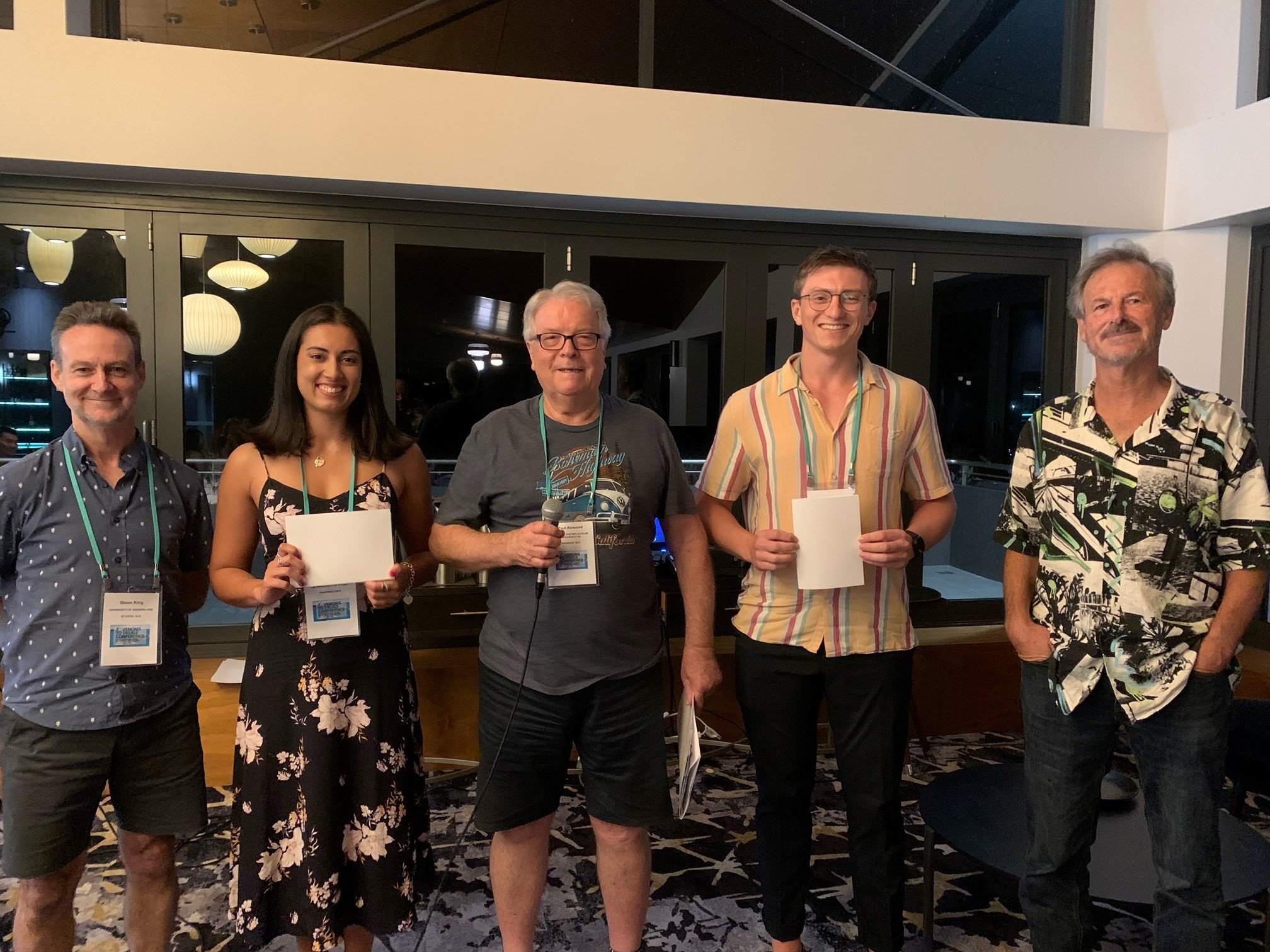Need Help?
29 April 2021
Congratulations to Best Speaker Award Winners at the 7th Venoms to Drugs Conference, Daydream Island, Whitsunday, 2021 (Sponsored by Toxins)
The editorial team of Toxins would like to congratulate the winners of the Best Speaker Award, Benjamin J. Tombling and Nisharnthi M. Duggan, at the 7th Venoms to Drugs Conference.
See the image of the awardees below (from left to right): Glenn King (Program Committee), Nisharnthi M. Duggan from Richard Payne’s lab at the University of Sydney (Best Speaker Award Winner), Paul Alewood (Convenor), Benjamin J. Tombling from David Craik’s lab at the University of Queensland (Best Speaker Award Winner), and Richard Lewis (Program Committee).

Here are the titles and abstracts of their work:
To Affinity and Beyond: Engineering Sub-optimal Peptide Drug leads Using Bioactive Cyclisation
Benjamin J. Tombling
Institute for Molecular Bioscience, Australian Research Council Centre of Excellence for Innovations in Peptide and Protein Science, The University of Queensland, Brisbane, Qld 4072, Australia
Peptides are regarded as promising next-generation therapeutics. However, to facilitate the translation of bioactive peptides into the clinic, optimisation strategies are almost always required. Peptide cyclisation strategies have been used to improve the drug-like properties of linear peptides. Until now, the primary focus has been on the use of ‘inert’ peptide linkers with respect to a biological target. Here, we show that affinity can be significantly improved by enriching the linker with functional amino acids, a concept termed bioactive cyclisation. We engineered a peptide inhibitor of PCSK9, a target for the clinical management of hypercholesterolemia, to demonstrate this concept. The identification of an optimised cyclisation linker from library screening produced a cyclic peptide with 100-fold improved affinity over the sub-optimal parent peptide. Furthermore, the cyclic peptide efficiently restores cholesterol metabolism in functional human liver cell assays, demonstrating a clear relationship between affinity and efficacy. The combination of thermodynamic binding analysis, SAR, NMR and MD studies confirmed the cyclisation linker forms favourable interactions with PCSK9, which are responsible for enhanced activity. A comprehensive analysis of bioactive peptides suggests many have underdeveloped affinities and we propose that implementing bioactive cyclisation linkers is a valuable addition to the armamentarium of peptide optimisation tools. This work was recently published in Journal of Medicinal Chemistry (DOI: 10.1021/acs.jmedchem.0c01766)
Brief Introduction of Benjamin J. Tombling: Benjamin completed his undergraduate studies in chemistry at The University Edinburgh before moving to Brisbane, Australia, where he recently finished his PhD under the supervision of Dr Conan Wang and Professor David Craik at The University of Queensland. His research has focused on establishing a platform of technologies to enhance the drug-like properties of underdeveloped peptide drugs leads, predominately for the development of inhibitors of PCSK9—a validated therapeutic target for the clinical management of hypercholesterolemia. However, a major incentive behind his work is that the strategies developed have the potential to be broadly applied throughout peptide drug design, including the engineering of toxin-derived peptides. Outside of the lab, he has a keen interest for watching and playing a variety of sports, and he enjoys spending time at the beach and cooking up a BBQ, taking advantage of the sunny days that Australia has to offer.
Total Chemical Synthesis of Venom and Salivary Proteins via Ligation Technologies
Nisharnthi M. Duggan, Sameer S. Kulkarni, Timothy S. Chisholm, Emma E. Watson and
Richard J. Payne
School of Chemistry, The University of Sydney, NSW 2006, NSW, Australia
The therapeutic potential of venom polypeptides and proteins is well recognised, with several venoms and venom-derived molecules approved for clinical use [1]. This has led to a significant demand for technologies to rapidly and efficiently access these biomolecules, especially when production through recombinant expression is low yielding, or for those bearing functionally important post-translational modifications (PTMs) [2]. We have developed a range of ligation technologies that enable the rapid chemical synthesis of peptides and proteins, with or without PTMs [3]. This talk will highlight the use of solid phase peptide synthesis and native chemical ligation in the synthesis of neuroprotective, cysteine-knot, funnel-web spider venom-derived peptide Hi1a, as well as the optimisation of oxidative folding [4]. A more recently developed methodology is the diselenide-selenoester ligation reaction [5,6]. This technology enables the fusion of peptide fragments with unprecedented kinetics and can be coupled with in situ deselenisation chemistry to afford native polypeptides and proteins [6,7]. The power of the DSL methodology will be highlighted via two examples: 1) the one-pot synthesis of anti-thrombotic salivary protein thrombostasin and 2) the total synthesis of a library of modified anti-thrombotic sulfoproteins, each of which could be assembled, purified and quantified for a bioassay within a few hours [8].
- King, G. F. Expert Opin Biol Ther. 2011, 11, 1469-1484.
- Kulkarni, S. et al. Nature Rev. Chem. 2018, 2, 0122.
- Thompson, R. E. et al. J. Am. Chem. Soc. 2014, 136, 8161-8164.
- King, G. F. et al. Proc. Natl. Acad. Sci. U.S.A. 2016, 114, 3750-3755.
- Mitchell, N. J. et al. J. Am. Chem. Soc. 2015, 137, 14011-14014.
- Kulkarni, S. et al. Nature Protocols, 2019, 14, 2229-2257.
- Mitchell, N. J. et al. Chem. 2017, 2(5), 703-715.
- Watson, E. E. et al. Proc. Natl. Acad. Sci. U. S. A. 2019, 16, 13873-13878.
Brief Introduction of Nisharnthi M. Duggan: Nisha is a PhD candidate at The University of Sydney, working for Professor Richard Payne in the area of organic chemistry and chemical biology. She graduated from Monash University in 2016 with a Bachelor of Science (Advanced, Hons I), including an honors research project focusing on synthetic methodology with Professor David Lupton. In 2017, Nisha took a break from her studies to undertake research at the ANU with Professor Michael Sherburn, and then briefly worked as an experimental scientist at CSIRO in Melbourne before moving to Sydney to commence her PhD in 2018. Throughout her PhD, Nisha has worked on the synthesis of venom and salivary peptides that may be used to treat stroke and thrombotic disease.

